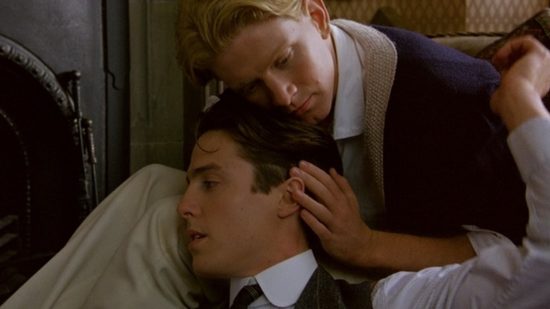Review: Maurice -“Beautifully told love story”
For many years Maurice was an overlooked entry in the Merchant Ivory canon. Consistently ignored in favour of films like A Room with a View, Howard’s End, and The Remains of the Day, it has taken several decades for the film to be properly revisited.
Adapted from E.M. Forster’s posthumously published novel of the same name, Maurice opens at Cambridge University where Maurice Hall (James Wilby) and Clive Durham (Hugh Grant) are both studying. Before long their friendship develops into something more intense and Clive professes his love for Maurice.
Their close relationship continues as Maurice becomes a stockbroker and Clive takes over the family estate and becomes a magistrate. They both fear that they will be exposed and after their friend Lord Risley (Mark Tandy) is imprisoned for soliciting sex with a soldier they end their affair. Clive settles with a nice naïve girl but Maurice finds is harder to accept ‘normal’ life.
From the outside Merchant Ivory Productions, built upon the legendary collaboration between director and screenwriter James Ivory and producer Ismail Merchant, can look a little stuffy and unexciting. Their films, in reality, are surprisingly subversive and are far more relevant than you might initially expect. The release of Call Me by Your Name, which Ivory adapted for the screen, seemed to remind audiences of this. Far from resembling an episode of Downton Abbey, their work is refreshing and contains very progressive and modern notions of class, gender, and society.
Maurice is full of surprisingly moments – none more than the revelation that Hugh Grant has been acting for more than 30 years. It is easy to be swept away in this beautifully told love story that is executed with an assured emotional conviction. As a viewer, you are more conflicted. As much as you want Maurice and Clive to be together you are wary of the wider social climate and the risk they run. Perhaps this says more about us and how status and acceptance still play too large a part in our lives.
Moments of gentle humour intercut what could have been an overly serious story. It also allows the film to satirise the characters and classes that it depicts. The film’s assertion that love is more important than wealth or social position may not be a new or radical one but it is delivered is such a sincere and convincing manner that it reminds us of how often we forget it.
Like many other Merchant Ivory films, the cinematography and set design are beautifully rendered and in keeping with the studio’s iconic style.
Perhaps it is fitting that it has taken so long for the film to be truly appreciated. Forster first wrote the novel back in 1914 but it wasn’t until after his death in 1970 that the story was published. Forster understood that the world was not ready for Maurice and that views needed to change before it could be released. The film was similarly misunderstood when it first came out with cinema-goers uninterested in the topics and themes that it addressed.
Audiences now are much more receptive to LGBT characters and storylines than they were in 1987. The success of Moonlight, Blue is the Warmest Colour, Carol, and many others have illustrated this change. While it is disappointing that Maurice was overlooked upon its original release, it is encouraging that the world has moved forward enough that it can be seen as a masterpiece second time round.
You can follow me on Twitter.










